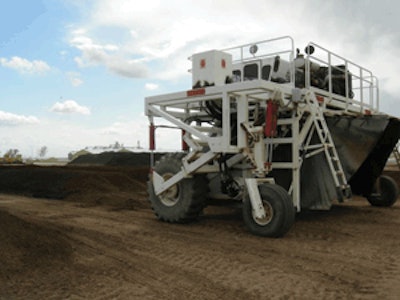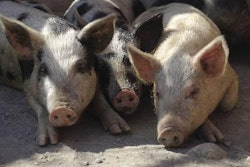
Morning Fresh Farms is fully integrated with on-site pullet rearing, feed mixing, egg production and processing and a unique added-value manure operation. Joe Raith is the CEO and Derek Yancey is president of the Colorado company established during the early 1970s.
The facility is located on 1,200 acres in Weld County and is guided by 12 principles emphasizing the production of safe products of consistent quality: Employees are expected to demonstrate a strong work ethic that is rewarded by fair remuneration in a safe and progressive workplace. The company also has a strong commitment to the community and operates according to the highest standards of environmental stewardship.
Current capacity includes slightly over one million hens in cages and a separate self-contained cage-free operation holding 150,000 hens. A dedicated feed mill produces up to 1,000 tons per week. Corn is purchased from Colorado farms and is mixed with soybean meal, distillers dried grains and animal by-products that are available in Colorado and adjoining states.
Morning Fresh has been a member of the Rocky Mountain Eggs Cooperative since 2005, participating with other producers in Western states in packing and distributing eggs in the region to balance supply with local demand. Caged and cage-free eggs are packed under the Eggland's Best Brand in addition to private label and Morning Fresh premium packs distributed over a seven-state area.
Recognizing the demand for cage-free eggs in the late 1990s, company president Derek Yancey undertook a review of available housing systems which would conform to the most rigorous standards of welfare. The company has erected a series of in-line houses fitted with the German Salmet aviary system which allow hens to feed, perch and lay in installations located on an upper level. Hens have access to the ground level with a layer of sand. Eggs are conveyed mechanically from the rollaway nests to rod conveyors for transport to a dedicated in-line processing plant.
The cage houses operated by Morning Fresh range in age from 30 years to recently-constructed units. From the outset of the operation, a commitment to on-belt manure drying systems was made. Manure is removed from houses two to three times per week from each house and is transported by trucks to an on-site processing facility. Most manure is dehydrated in a rotary kiln fueled by an on-site gas well. Product is packed in containers ranging from 1 lb. bags to 1 ton totes. Remaining manure is composted by mixing it with ground waste wood. The warm and dry climate facilitates processing of manure using Scarab agitators which transit longitudinal rows located over a 10-acre area on a compacted clay base.
Eggs from the cage houses are conveyed to a dedicated plant equipped with a new Diamond 8400 grader fitted with crack, dirt and blood spot detection. The separate cage-free plant processes brown eggs delivered in-line from the aviary units.
All pullets are reared on-site for both caged and non-confined units. Controlling both cage and floor housing allows for adequate control of weight and vaccination during rearing using trained and dedicated crews which are also responsible for handling and movement of flocks.
Company culture places a high value on sanitation, bio-security, vaccination and monitoring for possible disease. Investment in structural bio-security includes fencing, black-top roads and concrete aprons in front of houses, drains, security lighting and water retention ponds. Operational bio-security requires visitors to shower on arrival and at departure. All houses are secured against rodent and bird intrusion and the water supply is chlorinated. The company provides coveralls and uniforms to all employees who are screened for compliance with immigration rules and demands a policy of "no outside bird contact". The programs operated by Morning Fresh show the practicality of procedures that will be required by the U.S poultry and egg industries in the future in the event of the emergence and persistence of catastrophic diseases including avian influenza or vvND. A high standard of structural and operational bio-security is required in all aspects of operation in order to maintain the health of flocks located at a single location.


















